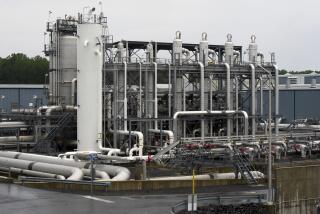Order Affects Occidental, 3 Other Big U.S. Oil Firms
- Share via
President Reagan’s order barring Americans and American companies from doing business with Libya most seriously affects four large U.S. oil companies, including Los Angeles-based Occidental Petroleum, that still have operations producing millions of barrels of oil there each year.
The three other firms are Conoco, Amerada Hess and Marathon. All four own oil wells in partnership with the Libyan government.
In addition, Price Brothers, a company in Dayton, Ohio, has a $150-million contract for a large irrigation project in Libya. Officials of the construction company were not available for comment.
The executive order signed by Reagan on Tuesday afternoon states that U.S. companies or individuals who defy the ban will be subject to criminal prosecution.
Spokesman at several of the oil companies said they need more time to study the order before commenting. A Conoco spokesman complained that Reagan did not explain what the directive meant when he announced it at a televised press conference.
“It’s too early to tell what our options are,” he said. “We’re going to get this spelled out in clearer terms.”
Occidental issued a statement, saying: “We will comply with all applicable U.S. laws regarding Libya. We will have no immediate comment on the President’s directive until we have had an opportunity to study it in detail.”
Although the order will undoubtedly be painful for the American firms, it is not expected to be fatal to any of them.
“In terms of our overall exploration and production, this is not a significant part of our business,” the Conoco spokesman said.
“It will not have that great an effect on us financially, although we will lose some production and reserves,” a Marathon spokesman said.
Occidental Petroleum said it has been reducing its investment in Libya for the last 15 years. It produces about 38,000 barrels a day from two oil fields in which the Libyan government is the majority owner, an Occidental spokeswoman said.
Occidental officials declined to give comparable up-to-date production figures worldwide, but the company’s latest official figures indicate that 310,000 barrels a day were produced in 1984.
In a statement released before the speech, Occidental noted that its Libyan operations have “continued to diminish and currently represent about 1% of our gross assets.” Occidental sold 25% of its Libyan operations last year to the Austrian national oil company for an undisclosed amount.
Conoco, Amerada Hess and Marathon are all minority partners in a company known as the Oasis Group, which is 59%-owned by the Libyan government. Conoco and Marathon each have a one-sixth interest in Oasis, while Amerada Hess owns a one-twelfth share.
Oasis’ daily production figures were not available, but a spokesman for Marathon said its Libyan operations produced more than 70,000 barrels a day in 1984.
Despite worsening relations between Libya and the United States in recent years, the Libyan government has allowed American oil companies to operate because the regime of Col. Moammar Kadafi cannot easily get along without them, U.S. petroleum industry specialists say.
“Kadafi may be irrational politically, but he’s very rational economically,” said Larry Goldstein, executive vice president of the Petroleum Industry Research Foundation, a non-profit, industry-funded research association.
“Occidental’s comments to me have always been that Libya needs the foreign expertise to operate these fields,” said David Eisinger, financial analyst for Duff & Phelps in Chicago.
U.S. oil industry spokesman usually defend doing business with Libya by noting that if the Americans leave, non-American oil companies would take their place. Libya produces a high-grade crude oil, most of which is exported to Europe.
The spokesmen also have argued that their companies’ purpose is to make money, not set moral standards.
“Companies should not make judgments about what’s moral and what’s immoral,” Goldstein said. “That’s the government’s job.”
All the U.S. oil companies reached for comment said they have been running their Libyan operations with non-Americans, mainly Libyans and Europeans, but press reports from Tripoli indicate that a handful of Americans may still work for the U.S. firms. Marathon said it has only eight employees left in the country, two of whom are Irish and the others Libyan. Conoco has only three employees left--two Britons and a Canadian.
Other companies have pulled up stakes completely. Exxon and Mobil, the two largest U.S. oil companies, left Libya several years ago.
However, there are up to 1,500 Americans still in Libya, many of them in the oil industry and under individual contract to the Libyan government.
More to Read
Sign up for Essential California
The most important California stories and recommendations in your inbox every morning.
You may occasionally receive promotional content from the Los Angeles Times.













